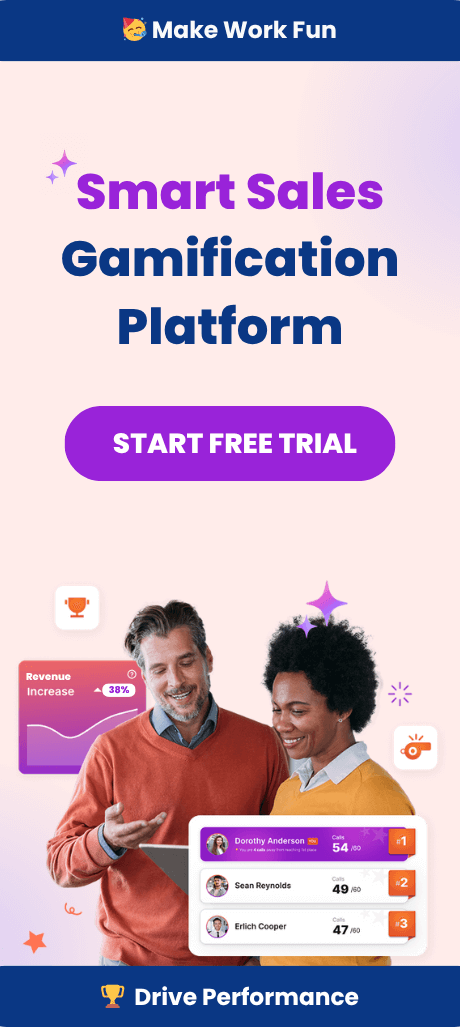Ignite Your Sales Motivation: Energize and Empower Your Team
Motivating a sales team has always been at the heart of driving business growth. In today’s fast-paced market, sales professionals face more competition, higher expectations, and rapidly changing customer needs. To keep a sales department performing at its best, sales leaders must find ways to inspire, engage, and energize their teams every day.
Effective sales motivation goes beyond offering incentives—it’s about creating an environment where every sales team member feels empowered to reach their full potential. By understanding what truly drives sales reps, businesses can design strategies that boost sales, encourage participation, and foster a culture of continuous improvement. Whether through recognition, skill development, or innovative gamification techniques, the right motivation can transform a sales process and set the stage for lasting success.
Definition of Spiffs
Spiffs—short for “Special Performance Incentive Fund”—are quick, targeted rewards offered to sales reps for achieving specific goals or closing deals within a set timeframe. Traditionally, spiffs take the form of cash bonuses, gift cards, or other external rewards designed to spark immediate action and boost sales activity.
A classic example of a spiff might be offering a $100 bonus to the first sales rep who closes five new accounts in a week. Spiffs have long been a staple in sales strategy, providing a simple way to incentivize short-term performance and energize the sales team during critical periods. While effective for creating urgency, spiffs are just one tool in the broader landscape of sales motivation.
The End of the Spiff Era
For decades, sales managers have relied on traditional spiffs—short-term monetary incentives—to drive sales behavior. However, as the sales landscape evolves, these quick-hit rewards are losing their impact. Today’s sales professionals seek motivation that goes beyond fleeting bonuses, craving recognition, growth, and meaningful engagement. The old spiff model often leads to burnout and short-lived spikes in performance rather than sustainable success.
Now, a new approach is emerging that focuses on long-term development and team collaboration. This shift marks the end of the spiff era and the beginning of innovative strategies that inspire consistent effort, skill-building, and genuine excitement within sales teams.
Evolution of Sales Teams
Sales teams have evolved dramatically over the years, adapting to new technologies, shifting customer expectations, and changing business models. Where once a sales department might have relied on cold calls and face-to-face meetings, today’s teams leverage online learning platforms, mobile apps, and virtual reality to connect with customers and close deals.

Modern sales teams are more collaborative, data-driven, and customer-focused than ever before. The rise of remote work, digital communication, and advanced analytics has transformed how sales professionals interact with leads and track progress. As businesses grow, sales teams must continuously adapt, embracing new ideas and tools to stay ahead of the competition and deliver exceptional customer satisfaction.
History of Sales Teams
The history of sales teams stretches back to the early days of commerce, when individual salespeople traveled door-to-door or worked in bustling marketplaces. As businesses expanded, the need for organized sales departments grew, leading to the creation of structured teams with defined roles and targets.
In the 20th century, the rise of mass media and telecommunication introduced new ways to reach customers, while the advent of computer games and online tasks inspired early forms of gamification in sales. Over time, sales teams became more specialized, with dedicated roles for lead generation, account management, and customer success. Today, high performing sales teams blend classic relationship-building skills with cutting-edge technology, creating a dynamic environment where collaboration, innovation, and adaptability are key.
Building a Successful Sales Team
A successful sales team is built on more than just numbers—it thrives on a strong culture, clear goals, and a shared commitment to excellence. Sales leaders play a crucial role in setting the tone, fostering healthy competition, and ensuring every team member feels valued and supported.
Key benefits of a high performing sales team include increased user engagement, higher customer satisfaction, and more repeat business. By incorporating elements like ongoing training, progress tracking, and peer recognition, sales managers can create an environment where everyone is motivated to achieve their best. The most effective teams embrace diversity, encourage engagement, and align their sales strategy with broader business objectives, ensuring sustainable growth and long-term success.
Hiring the Right Team
Building a winning sales team starts with hiring the right people. The hiring process should focus on finding candidates who not only have the necessary sales skills but also fit the team’s culture and values. Sales managers should look for individuals who are adaptable, eager to learn, and motivated by both personal achievement and team success.
Incorporating gamification elements into the recruitment and onboarding process can help identify top talent and accelerate knowledge retention. By offering incentives based on real-world scenarios and soft skills, businesses can ensure new hires are ready to contribute from day one. A thoughtful approach to human resource management—one that values diversity, collaboration, and continuous improvement—lays the foundation for a resilient, high-performing sales team that can drive business growth in any market.
Shifting Mindsets in Sales Departments
Sales departments have moved beyond aggressive, transactional tactics toward a focus on sustainable performance and team collaboration. Today’s sales leaders understand that fostering long-term growth requires aligning individual efforts with broader business objectives. It is essential to ensure the sales team’s goals are clearly defined and aligned with these objectives to drive consistent results. This shift encourages a culture where learning, skill development, and mutual support take precedence over quick wins.
By embracing this mindset, sales teams build resilience and adaptability, which are crucial in an ever-changing market. Collaboration replaces competition, creating an environment where every sales team member feels valued and motivated to contribute to collective success.
Why Traditional Spiffs Fail Modern Sales Teams
Traditional spiffs emphasize short-term wins, often neglecting critical factors like team morale and professional growth. While they may deliver quick sales spikes, these incentives frequently lead to burnout and disengagement among existing sales reps, undermining long-term productivity. Traditional spiffs also do not foster employee engagement, which is crucial for sustaining motivation and driving long-term organizational success.
Modern sales professionals seek motivation that supports continuous learning and meaningful achievement. Without addressing these deeper needs, spiffs become ineffective, causing turnover and a decline in overall sales performance. Organizations must rethink incentives to foster sustained enthusiasm and engagement.
The Rise of Gamification in Sales
The term gamification refers to the use of game design elements and principles in non-game contexts, such as sales, to motivate behavior and increase engagement. Gamification is revolutionizing sales by incorporating game mechanics into the sales process to drive sustained engagement and measurable results. This approach transforms routine tasks into exciting challenges, motivating sales professionals through intrinsic rewards rather than just monetary bonuses.
By leveraging elements like points, badges, and leaderboards, gamification creates a dynamic environment where sales reps are encouraged to improve continuously. This shift not only boosts motivation but also enhances skill development, leading to a more effective and fulfilled sales team.
Game Design Elements vs. Monetary Motivation
Unlike traditional bonuses, game design elements such as points, levels, challenges, and leaderboards tap into intrinsic motivation. Visual representations such as badges and avatars further enhance engagement and motivation by serving as symbols of achievement and personalized identifiers. These elements engage sales reps by making progress visible and rewarding effort in real-time, fostering a sense of achievement and healthy competition.
This approach encourages deeper involvement and personal growth, as sales professionals strive to unlock new levels and earn recognition. The result is a more engaged sales team that finds joy in the process, not just the payout.
Enhancing the Sales Process with Gamification Elements
Sales managers are integrating gamification elements like built-in rewards, progress tracking, and competitive fun into the sales process. A gamified system structures these elements—rewards, progress tracking, and competition—into a cohesive framework that drives engagement and motivation among sales teams. This evolution not only drives sales but also supports the professional development of every sales team member by making goals clear and attainable.

By turning sales activities into interactive experiences, gamification keeps reps motivated and focused. It fosters a culture where continuous improvement and healthy competition coexist, ultimately boosting both individual performance and team cohesion.
Gamification Strategy Drives Business Growth
An effective gamification strategy aligns goals across the sales department, transforming mundane tasks into performance-driven missions. This alignment ensures every sales activity contributes directly to broader business objectives, fostering purpose and clarity.
By incorporating game elements into daily workflows, gamification boosts motivation, engagement, and productivity. As the business grows, it is important to adapt gamification strategies to ensure they continue to motivate and engage the sales team effectively. It empowers sales teams to achieve consistent results while supporting the company’s long-term growth ambitions.
Why Sales Leaders Are Embracing Gamification
Sales leaders today recognize that traditional incentives no longer inspire the sustained motivation needed in a competitive market. Gamification offers a dynamic way to coach, track, and inspire sales teams in real-time, turning everyday tasks into engaging challenges. A sales manager can leverage gamification to set clear goals, monitor team performance, and motivate team members through targeted incentives. This approach empowers sales leaders to provide immediate feedback and celebrate incremental wins, fostering a culture of continuous improvement and enthusiasm.
By integrating gamification into their management style, sales leaders can better connect with their teams, tailor motivation to individual needs, and promote collaboration. This shift not only enhances performance but also builds a resilient, engaged sales force ready to meet evolving business demands.
Learning from Online Learning Platforms
Online learning platforms like Duolingo have set a benchmark by using gamified elements to boost knowledge retention and daily user engagement. These platforms transform learning into addictive, goal-oriented play, proving that game design can deeply motivate users over time. Game based learning makes training more interactive and effective for sales teams by leveraging feedback, progress tracking, and rewards to increase engagement. Sales teams can adopt similar strategies to turn training and development into enjoyable, habit-forming experiences.
By incorporating badges, streaks, and progress tracking, sales reps stay motivated to improve skills continuously. This approach encourages a growth mindset and enhances long-term knowledge retention, ultimately leading to a more capable and confident sales staff ready to close deals effectively.
Boost Sales Through Habit Formation
Gamification excels at promoting habit formation by encouraging micro-actions and daily wins that build momentum over time. Adding gamification elements to daily sales routines encourages consistent behaviors and habit formation by leveraging rewards, leaderboards, and social interactions. Instead of relying on unpredictable sales spikes, gamified systems help sales reps develop consistent behaviors that drive sustained success. These small, achievable goals create a rhythm that keeps motivation high and progress steady.
This habit-building approach transforms the sales process into a series of manageable steps, reducing stress and burnout. Over time, these habits compound, resulting in improved sales performance, stronger customer relationships, and a more confident, proactive sales team.
Data-Driven Motivation Over Guesswork
Unlike traditional spiffs, gamified systems provide real-time data and insights that empower sales managers to make informed decisions. This data-driven approach helps identify top performers, highlight areas needing improvement, and tailor coaching efforts effectively. Gamification work by integrating real-time data and feedback to motivate sales reps, making the experience more engaging and interactive. Managers gain clarity on what motivates each team member and how to support them best.

By leveraging performance metrics and behavioral trends, gamification replaces guesswork with precision. This transparency fosters accountability and encourages healthy competition, driving the entire team toward higher achievement and better alignment with sales goals.
Keeping Sales Professionals Engaged Long-Term
Game elements such as streaks, unlocks, and personal achievements offer sales reps meaningful, long-term goals that extend beyond monthly quotas. These features create a sense of progression and accomplishment, making daily tasks more rewarding and engaging. By providing clear goals and recognition, gamification supports ongoing employee performance by motivating and engaging employees in their tasks. By focusing on continuous growth, gamification sustains motivation over time.
This long-term engagement model helps reduce burnout and turnover, as sales professionals feel recognized for their efforts and see a clear path for advancement. Ultimately, gamification nurtures a committed, high-performing sales team that thrives on achievement and personal development.
Motivation Without Burnout
Traditional spiffs often lead to intense short-term effort followed by exhaustion, leaving sales reps drained and disengaged. Gamification offers a more balanced motivation framework that combines recognition, challenge, and support. In non-game contexts such as sales environments, gamification is effective at promoting balanced motivation by integrating game design elements to encourage steady progress and celebrate a variety of achievements, not just sales numbers.
By fostering a positive environment where effort is acknowledged and goals are attainable, gamification reduces pressure and prevents burnout. This holistic approach promotes well-being and sustained enthusiasm, enabling sales teams to perform consistently at their best without sacrificing their health.
Customization is Key to Engagement
Every high-performing sales team has its unique culture, strengths, and challenges. Customizable gamification platforms like Spinify allow sales leaders to tailor experiences that resonate with their specific team dynamics. Understanding the target audience is essential when customizing gamification platforms, as it ensures that the design and features meet the needs and motivations of the intended users. This personalization ensures that motivation strategies align with individual preferences and business objectives.
By adapting gamification elements such as rewards, challenges, and feedback mechanisms, sales leaders can foster deeper engagement and inclusivity. Customization empowers teams to connect authentically with the system, driving better participation and ultimately boosting sales performance across diverse groups.
Recognizing Existing Sales Reps
Gamification platforms don’t just focus on new hires—they elevate existing sales reps by tracking personal growth and rewarding consistency. By acknowledging ongoing achievements, these systems foster a culture where every sales team member feels valued and motivated to continually improve. This recognition helps retain top talent and encourages reps to push their limits, knowing their efforts are seen and appreciated.
Moreover, gamification personalizes the journey for each rep, offering tailored challenges and rewards that align with their unique strengths and goals. By considering each individual’s job profile, gamification can match challenges and incentives to the specific skills, experiences, and characteristics required for their role. This ongoing support transforms routine sales tasks into opportunities for growth, making every day a chance to excel and contribute meaningfully to the team’s success.
The Role of Peer Visibility
Leaderboards and peer rankings create healthy competition that fuels motivation beyond traditional incentives. When sales reps see their colleagues’ progress in real-time, it sparks a desire to improve and climb the ranks. Social interaction through features like leaderboards and rankings enhances motivation and engagement by allowing team members to connect, compete, and celebrate achievements together. This visibility transforms individual efforts into a shared experience, where success is celebrated openly and inspires others to elevate their performance.
Additionally, peer visibility fosters transparency and accountability within the team. It encourages collaboration as reps learn from top performers and share strategies. This dynamic environment builds camaraderie and drives a collective push toward achieving ambitious sales goals together.
Driving Team Collaboration, Not Just Individual Wins
Modern gamification recognizes group efforts by emphasizing team goals, collective milestones, and shared wins. This approach shifts the focus from isolated achievements to collaborative success, strengthening bonds among sales team members. Recognizing each sales role within the team helps design effective collaborative gamification strategies, ensuring that responsibilities and expectations are clear and that every member can contribute their strengths. When reps work toward common objectives, they develop a sense of unity and shared purpose that enhances morale and productivity.

Furthermore, team-based gamification encourages knowledge sharing and mutual support, breaking down silos within the sales department. It promotes a culture where everyone’s contribution matters, driving sustained business growth through cooperation rather than competition alone.
Real-Time Feedback Over End-of-Month Surprises
Traditional spiffs reward performance only at the end of a period, often leaving reps in the dark about their progress. Gamification changes this by providing immediate, real-time feedback that empowers sales professionals to adjust their strategies quickly. In gamified sales systems, virtual currency can be used to provide instant rewards and feedback, motivating reps to engage and improve continuously. This instant insight helps reps stay on track and continuously improve, leading to better outcomes.
Real-time feedback also fosters a growth mindset, as reps receive encouragement and constructive guidance throughout their sales journey. This ongoing communication creates a supportive environment where learning and adaptation are integral to daily work, making success more achievable and rewarding.
Engagement Meets Education
Gamified training modules combine learning with entertainment, making product knowledge and objection handling more engaging for sales reps. In educational settings, gamification techniques are widely used to motivate students by incorporating elements like badges and leaderboards, which enhance engagement and learning outcomes. These same strategies can be applied to sales training, turning education into interactive challenges that keep reps interested and motivated to master essential skills. This approach enhances knowledge retention and prepares the team to handle real-world sales situations confidently.
Additionally, gamified education fosters a culture of continuous learning, where reps eagerly pursue new competencies and share insights. This ongoing development not only improves individual performance but also strengthens the entire sales department’s ability to meet evolving customer needs and market demands.
Replacing Transactional Culture with Purpose
Gamification transforms sales from a transactional activity into a purposeful journey. It helps reps see their role as part of a larger mission, fostering deeper engagement and commitment. This sense of purpose motivates reps to go beyond quotas, focusing on meaningful contributions that drive long-term success.
By embedding values and goals into the gamification framework, sales teams develop a shared vision that aligns individual efforts with company objectives. Gamification also supports the onboarding process for each new hire by helping them quickly understand and adopt company values and goals. This cultural shift nurtures pride, loyalty, and a positive work environment where every team member feels connected and inspired to excel.
Enabling a Scalable Sales Strategy
Unlike one-off spiffs, gamified systems are designed to scale alongside your business. Whether you’re a startup or a large enterprise, these platforms grow with your sales team, adapting to changing needs and expanding capabilities. When selecting a gamification platform, it’s crucial to ensure it offers all the features necessary to support a growing sales team. This scalability ensures consistent motivation and engagement as your organization evolves.
Moreover, scalable gamification supports diverse sales structures and geographic locations, enabling unified performance tracking and goal alignment. It provides managers with tools to customize challenges and incentives, maintaining relevance and excitement across all levels of the sales force.
Positive Psychology in the Sales Environment
Gamification leverages positive psychology principles like dopamine loops and achievement cycles to boost motivation and performance. Fitness apps, for example, use gamification and positive psychology by incorporating rewards, challenges, and leaderboards to motivate users to exercise and improve their health—similar strategies can be applied in sales environments. By rewarding progress and celebrating milestones, it creates a continuous sense of accomplishment that energizes sales reps. This psychological reinforcement encourages persistence and resilience in the face of challenges.
Additionally, gamified environments promote well-being by balancing challenge and reward, reducing stress and burnout. The focus on positive experiences fosters a supportive atmosphere where reps feel confident, valued, and motivated to contribute their best every day.
Tracking Progress with Precision
Gamification allows sales managers to define clear, measurable milestones and monitor progress in granular detail. This precision enables timely interventions and personalized coaching, ensuring reps stay aligned with their goals. Detailed tracking transforms vague targets into actionable steps, enhancing focus and accountability.

Videos promoting team achievements can be integrated into gamification platforms to celebrate milestones, boost engagement, and increase visibility of top performers. With access to real-time data, managers can identify trends, celebrate achievements, and address performance gaps proactively. This transparency fosters trust and empowers the entire sales team to work smarter, driving consistent improvements and sustained success.
Empowering Sales Managers
Gamification tools equip sales managers with powerful dashboards that provide real-time insights into team performance, enabling swift and informed decisions. These platforms send timely alerts about trends and potential issues, allowing managers to proactively coach reps before challenges escalate. Personalized coaching opportunities arise from data-driven analysis, helping managers tailor their support to individual team members’ needs and strengths, fostering continuous improvement.
By leveraging gamification, sales managers transition from reactive overseers to strategic leaders who inspire and guide their teams effectively. This empowerment not only enhances sales performance but also builds a culture of accountability and growth, where every team member feels supported and motivated to excel.
Sales Targets Become Game Levels
Transforming traditional sales quotas into engaging game levels turns daunting targets into achievable milestones. In this gamified system, each sale can be tracked as a milestone, allowing teams to measure progress and celebrate every sales achievement. This approach breaks down large goals into smaller, manageable challenges that motivate reps to progress step-by-step. Each level achieved brings a sense of accomplishment, fueling ongoing enthusiasm and commitment to reach the next milestone.
By framing sales targets as game levels, reps experience a fun and interactive journey rather than pressure-filled deadlines. This shift encourages persistence and resilience, making sales goals feel less intimidating and more like exciting quests that drive consistent, successful outcomes.
Aligning with Broader Business Goals
Gamified platforms seamlessly connect individual and team objectives with overarching business growth strategies. This alignment ensures that every sales activity contributes meaningfully to the company’s long-term vision, fostering a sense of purpose among team members. Clear visibility of how daily efforts impact broader goals enhances motivation and strategic focus.
By integrating sales targets with business priorities, gamification promotes cohesive teamwork and coordinated efforts across departments. This strategic synchronization empowers sales teams to deliver results that not only meet quotas but also drive sustainable business expansion and success.
Encouraging Peer Recognition
Built-in kudos systems within gamification platforms foster a culture of appreciation by enabling sales reps to acknowledge each other’s achievements. This peer-to-peer recognition strengthens team bonds, boosts morale, and encourages positive reinforcement beyond managerial praise. Celebrating successes together creates an uplifting environment where everyone feels valued.

Encouraging peer recognition shifts the focus from competition to collaboration, nurturing mutual respect and camaraderie. When reps actively support one another, it cultivates a motivated, engaged sales force that thrives on shared victories and collective growth.
Eliminating the “Winners vs. Losers” Mentality
Traditional spiffs often spotlight only top performers, leaving others feeling excluded or discouraged. Gamification breaks this mold by promoting personal bests and individual progress, fostering a growth mindset across the entire team. Every rep is encouraged to strive for continuous improvement, regardless of their starting point.
This inclusive approach cultivates a supportive environment where success is multi-dimensional and accessible to all. By valuing effort and development over comparison, gamification creates a motivated sales culture that uplifts every member and drives collective achievement.
Breaking Down Silos in the Sales Team
Gamification encourages collaboration through cross-departmental challenges that unite marketing, sales, and customer success teams. These shared goals break down traditional silos, fostering communication and teamwork across functions. By working together in gamified activities, teams build stronger relationships and align efforts to drive overall business success.
This integrated approach enhances knowledge sharing and resource pooling, making the sales process more efficient and effective. Gamification transforms isolated departments into a cohesive unit focused on common objectives, boosting morale and accelerating growth.
Gamifying Sales Leads and Prospecting
Even early-stage sales activities like lead generation and prospecting benefit from gamification by turning routine tasks into engaging challenges. Reps are incentivized to prioritize pipeline building through points, badges, or friendly competitions, making prospecting more enjoyable and goal-oriented.
By gamifying these foundational steps, sales teams develop consistent habits that feed the entire sales funnel. This approach increases motivation to perform essential but often overlooked tasks, ultimately leading to a healthier pipeline and improved sales outcomes.
Redefining Success for Sales Professionals
Success in sales today extends far beyond hitting numbers. Gamification recognizes and rewards qualities like creativity, persistence, and continuous learning, making success a richer, multi-dimensional experience. Sales reps are motivated to innovate their approaches, overcome challenges, and grow their skills, fostering a culture where effort and improvement matter as much as results.
This broader definition of success empowers sales professionals to take pride in their personal development and contributions to the team. By celebrating diverse strengths, gamification nurtures a more engaged, resilient sales force ready to adapt and thrive in a competitive market.
Replacing Gut Feelings with Predictive Insights
Gone are the days of relying solely on intuition to manage sales teams. Advanced gamification platforms harness AI and data analytics to provide predictive insights, revealing which team members may need extra support or are poised to close deals. This data-driven approach removes guesswork from leadership decisions.
With real-time visibility into performance trends and behaviors, managers can proactively coach reps, allocate resources wisely, and optimize strategies. Predictive insights help create a more responsive, efficient sales environment that drives consistent success and boosts team confidence.
Celebrating Small Wins Along the Way
Maintaining motivation throughout the sales cycle is crucial, and gamification excels by spotlighting small achievements every day. Instead of waiting for end-of-month quotas, teams can celebrate incremental progress—like booking meetings, following up on leads, or learning new skills—keeping morale high and momentum steady.
This continuous recognition fosters a positive atmosphere where every effort counts, encouraging reps to stay engaged and persistent. By highlighting daily wins, gamification transforms the sales journey into a rewarding experience that builds confidence and drives sustained performance.
How Spinify is Leading This Transformation
Gamified sales performance stands at the forefront of the industry, offering a powerful engine tailored to motivate and engage sales teams. Its real-time leaderboards, personalized dashboards, and interactive challenges turn everyday tasks into exciting competitions that inspire reps to excel.
By combining data-driven insights with customizable gamification elements, Spinify helps organizations align individual efforts with business goals. This innovative platform not only boosts sales outcomes but also cultivates a vibrant, motivated culture where every team member feels valued and driven to succeed.
ROI that Goes Beyond the Bottom Line
Companies like HubSpot and Oracle have experienced more than just increased sales from gamification—they’ve seen higher rep engagement, improved customer satisfaction, and reduced turnover. Gamified systems create a more motivated workforce that stays committed and delivers exceptional service.
This holistic return on investment demonstrates that gamification benefits extend across the entire sales ecosystem. By fostering enthusiasm and loyalty, businesses build stronger customer relationships and cultivate a thriving sales culture that supports long-term growth.
A More Inclusive Way to Boost Sales
Gamification breaks down the one-size-fits-all approach to incentives by offering multiple paths to success tailored to diverse strengths. Whether a rep excels in creativity, persistence, or collaboration, gamification celebrates their unique contributions.
This inclusivity fosters a supportive environment where every sales team member feels recognized and empowered. By valuing varied talents, gamification drives greater participation, enhances team cohesion, and ultimately leads to more consistent, successful sales outcomes.
The Future Belongs to Gamified Sales Strategies
Traditional spiffs are fading because they focus narrowly on short-term results. The future of sales motivation lies in dynamic, evolving gamified systems that engage, educate, and celebrate reps daily. These systems build skills, foster collaboration, and sustain enthusiasm over time.
Embracing gamification means adopting a holistic approach that aligns individual growth with business objectives. As sales landscapes become more complex, gamified strategies will be essential to cultivating adaptable, high-performing teams ready to meet tomorrow’s challenges.
Experience the Spinify Revolution Today
The time has come to retire outdated spiff programs and embrace a holistic, data-driven approach to motivating sales teams. Spinify offers a seamless, engaging way to integrate gamification elements into your daily operations. Unlock your high-performing sales team’s full potential.




